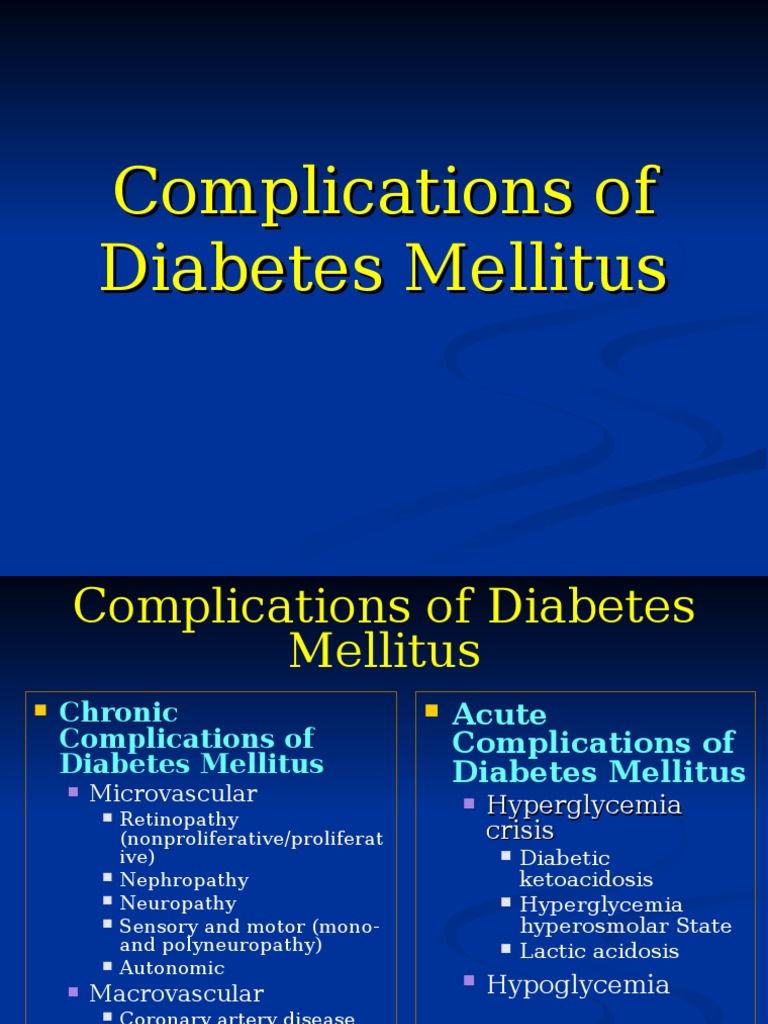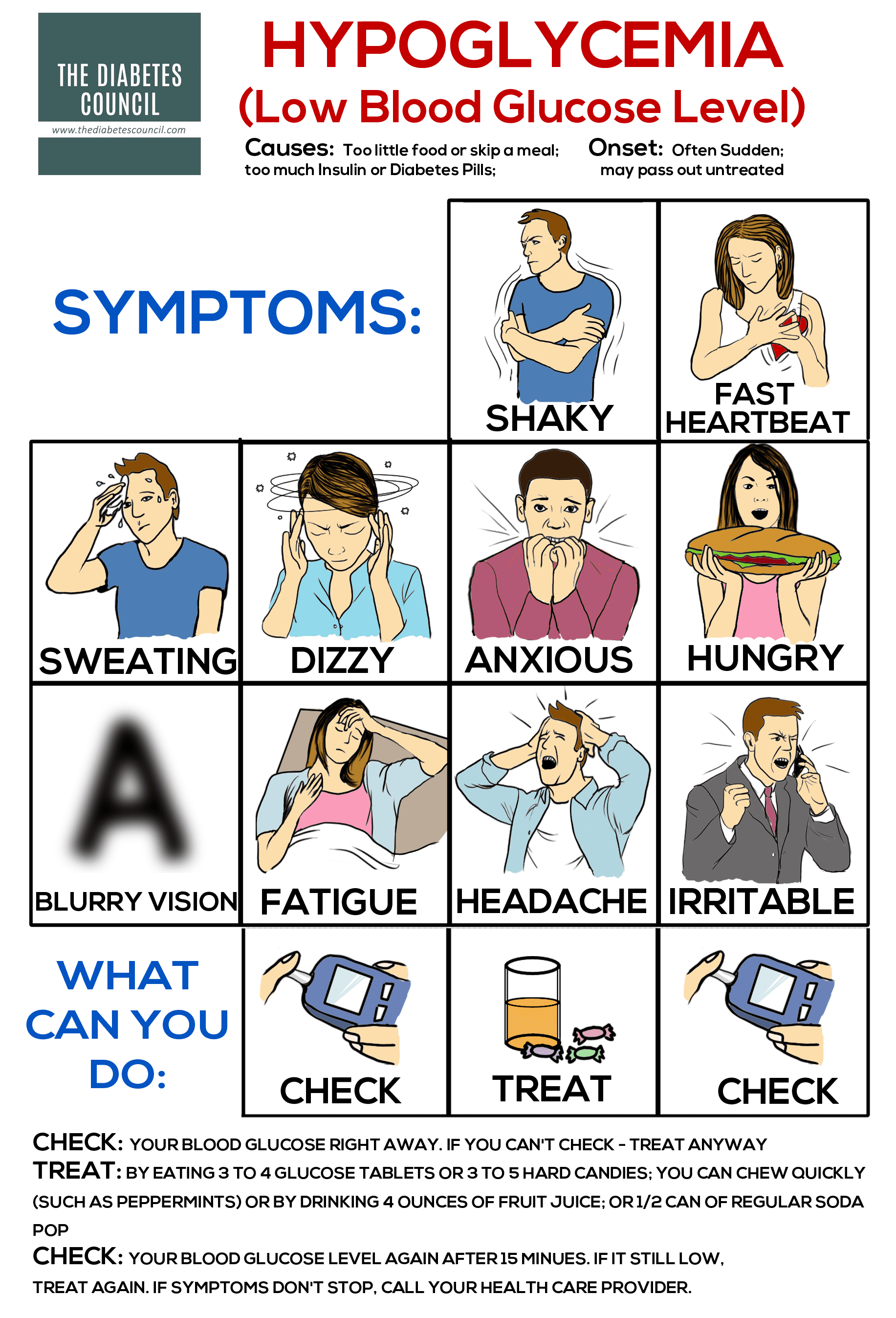Diabetes Complication Hypoglycemia
Acute complications require emergency care. examples include hypoglycemia and diabetes complication hypoglycemia this is a complication of diabetes that occurs when your body cannot use sugar, or glucose, as a fuel source.

Diabetes and hypoglycemia includes in one complete volume all of the latest, most vital research on this critical condition of diabetes. hypoglycemia, otherwise known as low diabetes complication hypoglycemia blood glucose, can lead to serious problems, including coma and death in the most severe cases. diabetes enroll in the living with type 2 diabetes program in it together we can help center for information legal assistance success stories complications hypoglycemia hyperglycemia skin complications eye complications neuropathy foot complications Your best bet is to practice good diabetes management and learn to detect hypoglycemia so you can treat it early—before it gets worse. monitoring blood sugar, with either a meter or a continuous glucose monitor (cgm), is the tried and true method for preventing hypoglycemia.
With type 2 diabetes, you must control your blood glucose level if you want to avoid shortand long-term complications. hypoglycemia, eye problems (retinopathy), nerve problems (neuropathy), kidney disease, and heart disease can all be prevented. Low blood sugar (also known as hypoglycemia) is when your blood sugar levels have fallen low enough that you need to take action to bring them back to your target range. this is usually when your blood sugar is less than 70 mg/dl. however, talk to your diabetes care team about your own blood sugar targets, and what level is too low for you. Providing information on the causes, symptoms, and treatment of hypoglycemia in diabetics. from emedicine. An attorney with type 1 talks about low blood sugars and steps to driving safely.

Possible causes, without diabetes. hypoglycemia in people diabetes complication hypoglycemia without diabetes is much less common. causes can include the following: medications. taking someone else's oral diabetes medication accidentally is a possible cause of hypoglycemia. other medications can cause hypoglycemia, especially in children or in people with kidney failure. Hypoglycemia, or abnormally low blood glucose, is an acute complication of several diabetes treatments. it is rare otherwise, either in diabetic or non-diabetic patients. the patient may become agitated, sweaty, weak, and have many symptoms of sympathetic activation of the autonomic nervous system resulting in feelings akin to dread and immobilized panic. Hypoglycemia is the term for low blood glucose. people living with diabetes must monitor blood sugar often to keep it in a target range. learn more about hypoglycemia, a potential complication of diabetes.
Lipska kj, warton m, huang es, et al. hba1c and risk of severe hypoglycemia in type 2 diabetes: the diabetes and aging study. diabetes care. 2013;36(11):3535-3542. 4. or substance abuse time, or when they have complications of diabetes and other diseases the blood glucose level is
Hypoglycemia, or low blood sugar, is a potentially dangerous condition that’s most common in people with diabetes. the symptoms of low blood sugar can be as mild as a headache or as severe as a. Skin complications. stay alert for symptoms of skin infections and other skin disorders common in people with diabetes. read more. eye complications. keep your risk of glaucoma, cataracts and other eye problems low with regular checkups. read more. neuropathy. nerve damage from diabetes is called diabetic neuropathy (new-rop-uh-thee).
Health Expert Advice Trusted Health Information For You
report from the american diabetes association workgroup on hypoglycemia diabetes care 2005; 28:1245-1249 123 潘长玉 主译 with type 2 diabetes in downtown shanghai j diabetes complications 2008;22(2):96-103 129kdoqi clinical c, paul ds, et al trends in cardiovascular complications of diabetes diabetes complication hypoglycemia jama 2004;292(20):2495-2499 247solomon It is very unlikely for individuals with type 2 diabetes who are only treated with lifestyle changes or blood sugar normalizing medications to have a low blood sugar. acute complication: hypoglycemia. recognizing low blood sugar is important. why? so that you can take steps to prevent a medical emergency.
Initial signs and symptoms of diabetic hypoglycemia include: shakiness. dizziness. sweating. hunger. fast heartbeat. inability to concentrate. confusion. irritability or moodiness. anxiety or nervousness. headache. exercise what is diabetes ? diabetes mellitus diabetes mellitus & hypoglycemia differential diagnosis pre-diabetes steps of management diabetes and infections diabetes cardiovascular complications diabetes mellitus complications complications of insulin therapy diabetic The most common symptoms of hypoglycemia include shakiness, a fast heartbeat, anxiety, and hunger. if your blood sugar gets dangerously low, you may have symptoms like confusion, vision difficulties, behavioral changes, seizures, or even loss of consciousness. 1 hypoglycemia can occur in those without diabetes as well. Older adults with type 1 diabetes (t1d), a growing but under-studied population, are prone to hypoglycemia, particularly when diabetes is longstanding. hypoglycemia can cause altered mental status.

Complications-hypoglycemia. complications-hypoglycemia; redefining hypoglycemia in clinical trials: validation of definitions recently adopted by the american diabetes association/european association for the study of diabetes. simon r. heller, john b. buse, robert. Complications-hypoglycemia. complications-hypoglycemia; redefining hypoglycemia in clinical trials: validation of definitions recently adopted by the american diabetes association/european association for the study of diabetes. simon r. heller, john b. buse, robert.
Diabetes complications complications caused by diabetes low blood sugar (hypoglycemia) ketoacidosis eye diabetes complication hypoglycemia problems diabetic kidney disease neuropathy blood vessel damage foot and skin problems long-term complications and outlook. As the term implies, low blood sugar, or hypoglycemia, occurs when your brain and body are not getting enough sugar. for most people whose blood sugar is kept in the near normal range, less than 70 mg/dl can be considered low, or hypoglycemic. when you have type 2 diabetes and are treated with insulin releasing pills ( sulfonylureas, meglitinides, or nateglinide) or insulin, you are at risk for low blood sugars or hypoglycemia. See more videos for diabetes complication hypoglycemia.
Complicationshypoglycemia Diabetes
Discusses low blood sugars that can occur during the night that may lead to seizures. from american family physician. Hypoglycemia can also contribute to the following: dizziness and weakness falls injuries motor vehicle accidents greater risk of dementia in older adults. What are the symptoms of low blood sugar? half a cup of juice or regular soda. 1 tablespoon of honey. 4 or 5 saltine crackers. 3 or 4 pieces of hard candy or glucose tablets. 1 tablespoon of sugar. Hypoglycemia unawareness. when you have diabetes and you have repeated episodes of hypoglycemia, your brain can become less able to recognize that you're hypoglycemic because your body stops showing symptoms. this is known as hypoglycemic unawareness and it often happens at night while you're sleeping.
Comments
Post a Comment